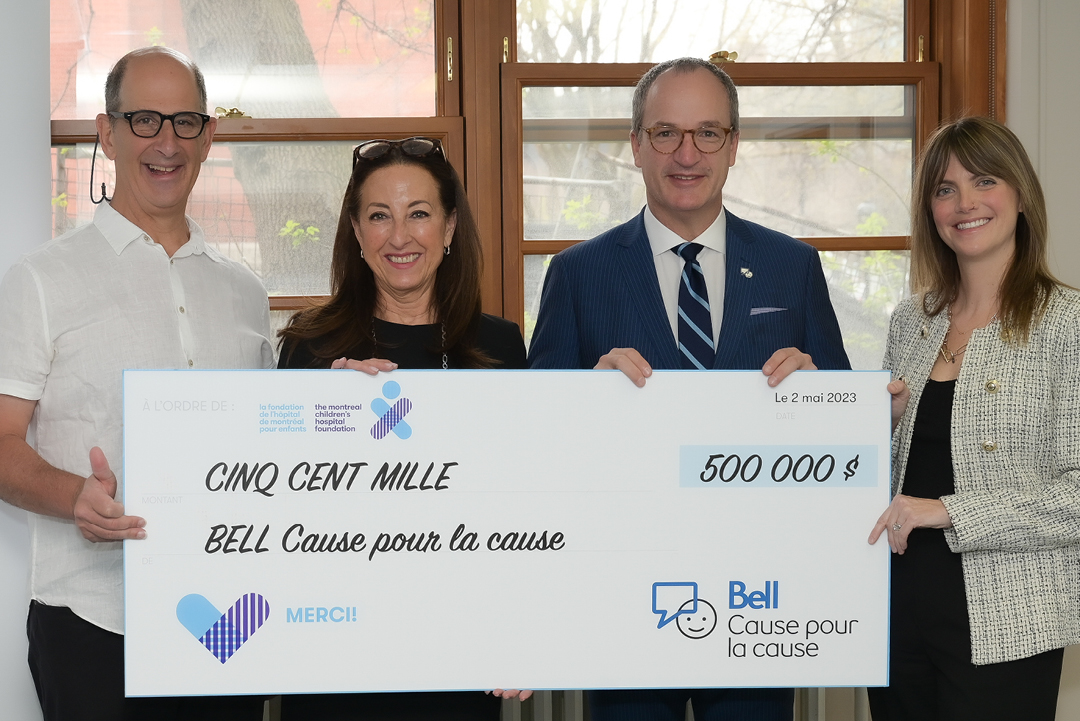Mental Health: A generous donation of $500,000 to help children with eating disorders
Tuesday, May 02, 2023
Photo: Natasha Rousseau
Recognizing the dramatic increase in eating disorders among children and adolescents in recent years, Bell Let's Talk, a generous partner of The Children's Foundation, is donating $500,000 over five years to help improve care for young patients struggling with their mental health.
Eating disorders, such as anorexia nervosa, are the 3rd most common chronic illnesses in adolescence after asthma and obesity. These illnesses have both psychological and physical components that can dramatically impact a child’s growth, brain function, bone strength, sexual development, and cardiac health.
In 2020, The Children’s Eating Disorders Program assessed 103 patients for eating disorders. In 2021, assessments jumped to 156, a 50% increase. In addition, the children were more severely ill than usual, both physically and psychologically.
Bell Let’s Talk in support of children with eating disorders
Bell is donating $500,000 over five years to the Foundation, in support of The Children's Eating Disorders Program, which will allow for the hiring of an additional full-time therapist.
“Bell Let’s Talk is pleased to donate $500,000 to The Children’s to support the Eating Disorders Program so more children and teens with eating disorders receive the lifesaving care they need as quickly as possible. This gift builds on our longstanding partnership with The Children’s Foundation and is part of our commitment to improving access to mental heath care in Canada,” said Mary Deacon, Chair of Bell Let’s Talk.
The Foundation is grateful to Bell Let's Talk for helping children like Chloe access the care they need as quickly as possible.
Overcoming eating disorders: Chloé's inspiring story

Chloé* was only seven years old when she started to have disordered eating. At first, the symptoms were subtle; she’d leave food on her plate or skip dessert. Progressively, her eating behaviour got worse. She would nibble at her food and claim she wasn’t hungry because she’d eaten too many snacks. Slowly, she was developing a full-fledged eating disorder.
During the pandemic, Chloé’s eating habits took a turn for the worse.
Unbeknownst to her family, Chloé, who was by then age nine, stopped eating altogether. Within three weeks, she lost eight kilograms and her weight plummeted to a mere 28 kilograms. She could barely walk. Her family rushed her to The Children’s Emergency Department.
At the Hospital, Chloé and her parents met Dr. Giuseppina Di Meglio, an adolescent medicine specialist and a member of the Eating Disorders Program. Chloé’s condition was severe. She had lost so much weight her internal organs had no more visceral fat which caused her a lot of pain. She was just skin and bone.
The family signed up for Family Based Treatment (FBT), the leading treatment for adolescent restrictive eating disorders, which is done at home with regular hospital follow-ups.
FBT focuses on helping parents take the lead in refeeding their child and normalizing their eating patterns. The goal of therapy is complete remission, which means reaching a healthy weight, resuming pubertal development, reversing medical complications, and restoring normal thought patterns and behaviours around food.
Magali*, Chloé’s mom, remembers sitting down at the start of FBT with her daughter for her first meal. Six hours. It took six hours of urging, cajoling, and reassuring to get her daughter to eat six pieces of tortellini. Chloé adamantly refused. She screamed, howled ,and cried. She lashed out physically, hitting and slapping her mom and dad.
This behaviour continued day after day, at every meal and snack.
“It was a truly awful time. But I had to be relentless with Chloé. I couldn’t give in. I had to make her eat. Her life was as risk,” said Magali, whose own health started to suffer due to the stress of the ordeal.
It took two long years before Chloé overcame her eating disorder
For the past six months, Chloé, now age 11, has been doing well. She is at a healthy weight. She is smiling again and eating like a regular kid.
“Eating disorders are curable, especially if treatment starts early. However, families need to remember eating disorders are chronic illnesses that don’t improve after a few visits – it takes time and effort from both the child and their family to overcome all aspects of the disorder. With the family and treating team working together, most adolescents will fully recover from their physical and behavioural symptoms,” said Dr. Holy Agostino, Director of The Children’s Eating Disorders Clinic.
*Chloé and Magali have asked that their real names not be used.
Worried your child has an eating disorder?
If you are worried your child might have an eating disorder, talk to your family doctor, who knows your child’s medical history and has an established relationship. After the assessment, depending on the child and family’s needs, your physician may refer you to specialized services.
Useful resources are available online or in print about family-based therapy treatments and how parents can adopt this therapeutic approach at home. Some of these are accessible on the Eating Disorder Program page on The Montreal Children’s Hospital website.
